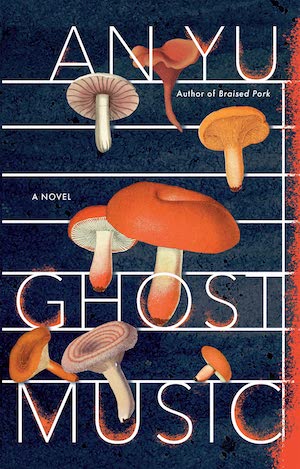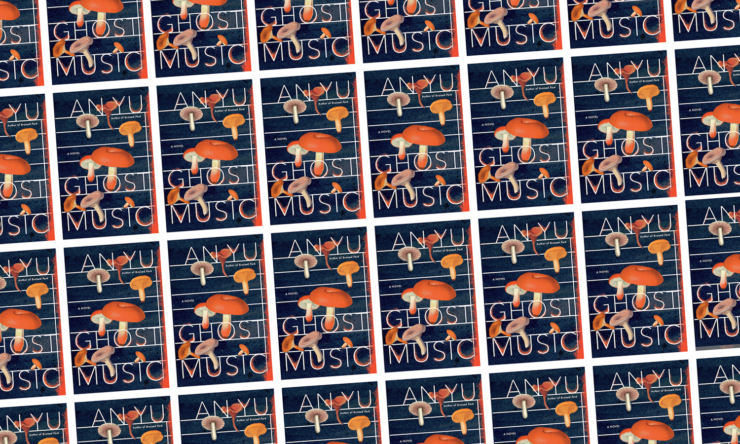An Yu’s Ghost Music is most definitely a haunted novel in every way—psychologically, philosophically, and literally. This intricate and eerie book leaves the reader with more questions than answers—the kind of questions that can hunt your thoughts relentlessly, leaving behind only the tiny echo of reality.
Carefully built beneath the obvious plot, as if actual mycelium, are Ghost Music’s mushrooms: edible mushrooms and ghostly mushrooms that hold the essence of a possible human consciousness and can converse with people. It is enchanting and harrowing and An Yu has painstakingly crafted a world where these beloved—yet still unknowable—fungi are both the ghostly magic we yearn for but that we’ve also always had within our grasp.
Buy the Book


Ghost Music
At the center of the book is Song Yan, a young woman who, in an act of passive rebellion, gave up a burgeoning career as a concert pianist to instead settle as a piano teacher and marry an emotionally unavailable workaholic partner (though arguably Yan is as emotionally closed off as her husband). The novel opens up with what Yan believes to be a dream, possibly a portent, where she is trapped in a doorless room with a small orange mushroom who tells her it would like to be remembered.
Her husband, Bowen, has moved them to a larger apartment in Beijing to accommodate his mother after his father’s death, and mysterious boxes of mushrooms begin to arrive with no known return address. Yan’s relationship with her mother-in-law is awkward and strained at best, as is her relationship with Bowen as she pushes for a child and he rebuffs her pleas. It is only through cooking the mushrooms that she and her mother-in-law can interact functionally, and Bowen’s consumption of them acts as a type of metaphor for being there in body but not spirit.
During this time Yan learns from her mother-in-law that Bowen has a sister who she had to send away as a child due to their family’s poor financial circumstances. When the mushrooms finally stop coming, Yan receives a letter from someone who claims to be the famous piano master Bai Yu, who had mysteriously disappeared a decade before, and whom she had once seen in concert with her father. She decides to visit this possible Bai Yu and finds him isolated in a barely furnished apartment. He asks her to play a particular song on his piano and tells her, “I want you to help me find the sound of being alive.”
When she fails to play to his satisfaction, Yan leaves, determined to find that sound and come back. But while listening to a recording of her younger self playing a song her father wrote, she falls into the black hole that led Bai Yu to self exile, to retreat from the world and choose a life as a forgotten ghost:
Somewhere towards the second half of the piece, I realized I had forgotten I was the one playing. No matter how I tried, I couldn’t picture myself pressing those keys and producing those sounds. The music came to me as undeniably as the feeling of still air touching skin, as if no one was playing it and it had just always been there. A feeling of horror surged into my head and my vision went blank. I clasped the wheel and tried to recall whether the highway was straight.
Then Yan also discovers Bowen has an ex-wife and child, the latter of whom has drowned after an unexplainable orange dust first appears in Yunnan, Bowen’s hometown. Yan begins to unravel as the identity she believed was hers and the life she convinced herself she was living become as if strangers to her. She can no longer sleep and leaves her husband to wander the city, transformed into a living specter who visits her own personal ghost until even Bai Yu disappears and all she is left with is the empty apartment with no doors and the reproducing orange mushroom, who may or may not be Bai Yu. It is through her strange and terrifying experience with the mushroom that she finally weaves together a repairing of the psyche and self.
Ghost Music asks us questions key to our own current survival: How have we allowed our emotional landscapes to separate from our bodies? How have we allowed ourselves to live this way: sick and getting sicker each year? We uprooted ourselves from the world and now we haunt it to death. Many people who have had Covid-19 report a strong neurological effect, even those who were mildly symptomatic or asymptomatic, finding themselves driving, unaware of where they are or where they are going for long minutes. The phenomenon of entering a room and forgetting what you meant to do has increased alarmingly. Some even report not being able to read or write for months, a terrifying thought for any writer. There are horrors unknown and known in this disease. But then I also think about the fungi, who shaped our entire planet and who never stopped singing out to us, even when we stopped singing out to them. What is the sound of being alive?
What can’t mycelium do?, I imagine An Yu asking, as I have asked myself upon learning that the first plants that migrated from sea to land had no roots and it was mycelium that partnered with them to create those root systems. Scientists have even begun to speculate mycelium networks can communicate with actual words. Sound artists make music out of mycelia and plant communications. Adaptogenic mushrooms may also be key to helping us treat symptoms of long Covid. They thrive through decay. They know themselves in a way we have barely begun to fathom about our own species. They may have answers if we learn which questions to ask.
If Ling Ma’s Severance gave us a chilling pre-pandemic glimpse of how our capitalistic system would foster a deadly virus that turns humans into unthinking automatons doomed to living death, then Ghost Music shows us how we might find the trigger to wake us up, confront our grief and loss, and finally begin to heal.
Ghost Music is published by Grove Press.
Angela Maria Spring is the owner of Duende District, a mobile boutique bookstore by and for people of color, where all are welcome. She holds an M.F.A. in poetry from Sarah Lawrence College, was a 2018 Kirkus Fiction Prize judge, and has work forthcoming in Radar Poetry, Pilgrimage, Borderlands: Texas Poetry Review, and Third Wednesday. You can find her on Twitter at @BurquenaBoricua or at duendedistrict.com.










